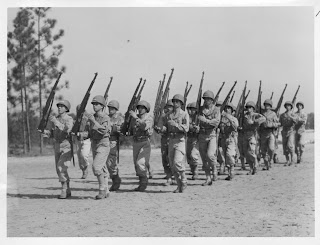Iva Toguri Broadcasting from Radio Tokyo
By degrees The Zero Hour increased in popularity. Major Tsuneishi decided to expand the time slot to an hour. He added two Nisei, George Mitsushio and Kenkichi Oki, to the production team. Additionally Tsuneishi insisted that a woman commentator be added to the program. The last thing Cousens wanted was a sultry voiced Mata Hari like June Suyama, “The Nightingale of Nanking,” or sexy Myrtle “Little Margie” Lipton,” to skewer his lampoon of The Zero Hour. What he needed was a woman he could trust. The woman he selected was the chatty Nisei typist, who had no radio experience and whose voice had all the charm of a scratched record—Iva Toguri.
Everyone connected to The Zero Hour was astonished by Cousens’s choice of Toguri as his female voice for The Zero Hour. Ince said she had the voice of a crow. Mitsushio, the Nisei script writer, thought it was a joke. For Cousens, Toguri’s voice was a perfect fit for his propaganda parody. He said, “With the idea I had in mind of making a complete burlesque of the program, her voice was just what I wanted—rough. I hope I can say this without offense—a voice that I have described as a gin fog voice. It was rough, almost masculine, anything but a femininely seductive voice. It was a comedy voice that I needed for this particular job.” It was a hard sell, but Cousens convinced Tsuneishi that Iva Toguri was the best choice to host the Zero Hour.
Promoting Toguri as the star of The Zero Hour was one thing; getting her to accept was another. His task was formidable. He had to convince a woman who had endured scorn and malnutrition because she refused to relinquish her American citizenship to become the female voice of a Japanese propaganda broadcast. When Cousens first broached the subject, Toguri flatly refused. She had access to western news reports, and she knew the tide of the war was shifting to the Allies. The idea of participating in a Japanese propaganda effort was ludicrous. At first she laughed Cousens off, but he persisted, telling her she would actually help the Allies by contributing to his parody. Cousens told her that, if she didn’t take the job, Tsuneishi would force him to use Ruth Hayakawa or another experienced Japanese propaganda voice. Although she was not fully convinced it was a good idea, Toguri trusted Cousens. She agreed to host The Zero Hour. It was a life-changing decision that would brand the plucky American patriot as a traitor.
At six PM on November 10, 1943, Iva Toguri sat down in front of a microphone in Studio 5 of Radio Tokyo. She made a few announcements and played four records, and in twenty minutes her part of The Zero Hour was over. Afterwards she confronted Cousens in the studio. “This is crazy,” she said. “I’m no good at this.” He tried to humor her. “You are just what we want,” he replied. “We want a Yankee voice with a certain personality in it—a little touch of WAC officer and a lot of cheer. I’ll coach you to read scripts the way I want them, so don’t worry.”
A few days later Cousens told Toguri she needed a broadcast name. He used the first syllable of “an” in announcer and combined it with “orphan” a term he thought GIs could identify with because many dubbed themselves “orphans of the Pacific.” So Iva Toguri became “Orphan Ann,” and another ironic twist was added to the life of the Nisei who, as a child sat transfixed next to her radio listening to the adventures of Orphan Annie. But she was a real-life Orphan Ann and there was no Daddy Warbucks to rescue her.
Quote - - "They Called Her Tokyo Rose"- Gunn p.51
Quote -- Duss, p. 81







